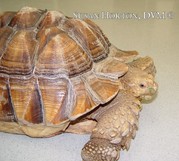Diet For Sulcata Tortoises
Photos and edited by Susan Horton, DVM

What you feed your Sulcata is critical to its health and development
Sulcata tortoises evolved to deal with life in a semi-arid environment, where the only food available for much of the year is dry grasses and weeds. Sulcata tortoises require a very high-fiber, grass-based diet to stay healthy. If you feed the wrong foods to your tortoise, it will grow too quickly, develop a bumpy, pyramided shell, and may develop other health problems that could drastically shorten its lifespan.
Common Dietary Problems with Sulcata tortoises
There are five common dietary problems that owners of sulcata tortoises typically encounter when feeding their tortoises:
Sulcata tortoises evolved to deal with life in a semi-arid environment, where the only food available for much of the year is dry grasses and weeds. Sulcata tortoises require a very high-fiber, grass-based diet to stay healthy. If you feed the wrong foods to your tortoise, it will grow too quickly, develop a bumpy, pyramided shell, and may develop other health problems that could drastically shorten its lifespan.
Common Dietary Problems with Sulcata tortoises
There are five common dietary problems that owners of sulcata tortoises typically encounter when feeding their tortoises:
- Not providing enough fiber
- Providing too much protein
- Giving fruit or other sugary foods to grazing tortoises like sulcata and leopard torts
- Not providing enough calcium, or the right calcium/phosphorus balance
- Generally overfeeding the tortoise

How to Avoid These Common Dietary Problems
You are responsible for the health and well-being of your tortoise, so you must make the effort to feed the right foods, and in the right quantities. Here are a few suggestions to help you avoid the typical dietary pitfalls:
1. Provide enough fiber by feeding your tortoise a diet that is based predominantly on grasses with some edible weeds, leaves and flowers, as described in more detail below.
2. AVOID giving your tortoise foods that contain high levels of protein. This means that you should NEVER give your sulcata tortoise the following foods.
3. AVOID giving your sulcata fruit! Even though sulcata love fruit, it's best NOT to give them any, if possible. Grazing tortoise species such as leopard and sulcata rely on beneficial bacteria in their intestines to help them digest and extract nourishment from the grasses that they eat. If you give your tortoise large amounts of fruit, the acids and sugars in the fruit can actually change the pH of the tortoise's digestive tract, and this pH change can cause the beneficial bacteria in the tortoise's gut to die off. When large quantities of gut bacteria die, they release toxins that can cross the gut wall and enter the tortoise's bloodstream, causing the tortoise to experience a form of Toxic Shock Syndrome that can be fatal.
4. Provide the right amounts of calcium and avoid foods that prevent calcium absorption. Sulcata tortoises require a great deal of calcium in their diet to help them grow healthy bones and shells. The Sahel area of Africa where sulcata naturally occur is a semi-arid region that has calcium-rich soils. Wild sulcata tortoises therefore get sufficient calcium by eating the grasses that grow in these calcium-laden soils.
Think about where you live and how you feed your tortoise. If you live in a semi-arid or arid area with little rainfall, the calcium levels in your local soil will be relatively high. Any grasses grown in such a calcium-rich soil will also be high in calcium, so if you allow your tortoise to graze at will on grasses grown in this soil, you might not have to give your tortoise much in the way of calcium supplements.
In choosing a calcium supplement, make sure you choose one that does NOT contain Phosphorus. Calcium (CA) and Phosphorus (P) are both necessary to build healthy bone tissue. However, the phosphorus available in most food items is used much more readily by the tortoise's body than calcium, so you really don't need to supply any additional phosphorus to your tortoise.
Rep-Cal is a good calcium supplement, and is available at many pet stores. However, a large bag of plain, powdered limestone (calcium carbonate) will probably cost you a lot less. You can find 50-pound bags of calcium carbonate at livestock supply stores or feed stores that sell poultry supplies. The best way to use Rep-Cal or powdered calcium carbonate is to sprinkle a small amount lightly over the tortoise's food on a regular basis.
Certain foods contain oxalic acid compounds that prevent the body from absorbing calcium from food. You should AVOID feeding your tortoise the following foods regularly because of the oxalic acids in them:
5. AVOID over-feeding your tortoise. Sulcata tortoises can experience a variety of health problems when they are fed the wrong foods-but they can also have problems when they are fed too much of the right foods. Overfeeding is the single biggest mistake that most tortoise keepers make. Reptiles have slower metabolisms than mammals like dogs and cats, so they really do not need to take in as much food as you might think.
You should also consider the activity level of your tortoise. Can he go outdoors and walk around a secure yard everyday? Or does he stay indoors on a small tortoise table? If your tortoise is mostly sedentary, he doesn't need to be fed every day-really! Every other day is fine, even though he may look up at you with pleading eyes in between feedings. A certain amount of "tough love" is required on your part to not give in.
If you have any questions, please feel free to call us at 847-329-8709.
You are responsible for the health and well-being of your tortoise, so you must make the effort to feed the right foods, and in the right quantities. Here are a few suggestions to help you avoid the typical dietary pitfalls:
1. Provide enough fiber by feeding your tortoise a diet that is based predominantly on grasses with some edible weeds, leaves and flowers, as described in more detail below.
2. AVOID giving your tortoise foods that contain high levels of protein. This means that you should NEVER give your sulcata tortoise the following foods.
- Cheese or dairy products of any kind
- Cat or dog food of any kind
- Legumes (peas, beans, green beans, soybeans or soy-based products like tofu)
- Grains and Grain products (corn, wheat, barley, rye, etc.)
- Vegetables in large quantities-All types of produce grown for human consumption-even dark leafy greens - are too high in protein for sulcata tortoises to thrive on. However, SMALL quantities, given ONCE IN A WHILE as a treat, don't seem to be harmful.
- Commercially available "tortoise diets" (such as Pretty Pets, Mazuri, Zoo Med, etc.)
3. AVOID giving your sulcata fruit! Even though sulcata love fruit, it's best NOT to give them any, if possible. Grazing tortoise species such as leopard and sulcata rely on beneficial bacteria in their intestines to help them digest and extract nourishment from the grasses that they eat. If you give your tortoise large amounts of fruit, the acids and sugars in the fruit can actually change the pH of the tortoise's digestive tract, and this pH change can cause the beneficial bacteria in the tortoise's gut to die off. When large quantities of gut bacteria die, they release toxins that can cross the gut wall and enter the tortoise's bloodstream, causing the tortoise to experience a form of Toxic Shock Syndrome that can be fatal.
4. Provide the right amounts of calcium and avoid foods that prevent calcium absorption. Sulcata tortoises require a great deal of calcium in their diet to help them grow healthy bones and shells. The Sahel area of Africa where sulcata naturally occur is a semi-arid region that has calcium-rich soils. Wild sulcata tortoises therefore get sufficient calcium by eating the grasses that grow in these calcium-laden soils.
Think about where you live and how you feed your tortoise. If you live in a semi-arid or arid area with little rainfall, the calcium levels in your local soil will be relatively high. Any grasses grown in such a calcium-rich soil will also be high in calcium, so if you allow your tortoise to graze at will on grasses grown in this soil, you might not have to give your tortoise much in the way of calcium supplements.
In choosing a calcium supplement, make sure you choose one that does NOT contain Phosphorus. Calcium (CA) and Phosphorus (P) are both necessary to build healthy bone tissue. However, the phosphorus available in most food items is used much more readily by the tortoise's body than calcium, so you really don't need to supply any additional phosphorus to your tortoise.
Rep-Cal is a good calcium supplement, and is available at many pet stores. However, a large bag of plain, powdered limestone (calcium carbonate) will probably cost you a lot less. You can find 50-pound bags of calcium carbonate at livestock supply stores or feed stores that sell poultry supplies. The best way to use Rep-Cal or powdered calcium carbonate is to sprinkle a small amount lightly over the tortoise's food on a regular basis.
Certain foods contain oxalic acid compounds that prevent the body from absorbing calcium from food. You should AVOID feeding your tortoise the following foods regularly because of the oxalic acids in them:
- Spinach
- Kale
- Broccoli
- Mustard Greens
- Cauliflower
5. AVOID over-feeding your tortoise. Sulcata tortoises can experience a variety of health problems when they are fed the wrong foods-but they can also have problems when they are fed too much of the right foods. Overfeeding is the single biggest mistake that most tortoise keepers make. Reptiles have slower metabolisms than mammals like dogs and cats, so they really do not need to take in as much food as you might think.
You should also consider the activity level of your tortoise. Can he go outdoors and walk around a secure yard everyday? Or does he stay indoors on a small tortoise table? If your tortoise is mostly sedentary, he doesn't need to be fed every day-really! Every other day is fine, even though he may look up at you with pleading eyes in between feedings. A certain amount of "tough love" is required on your part to not give in.
If you have any questions, please feel free to call us at 847-329-8709.
